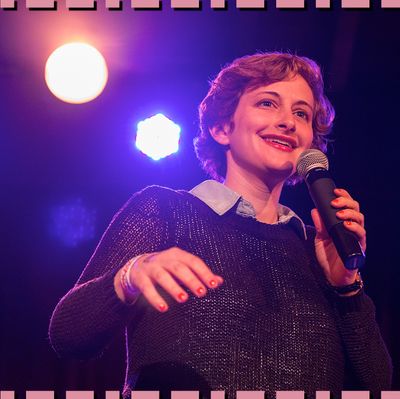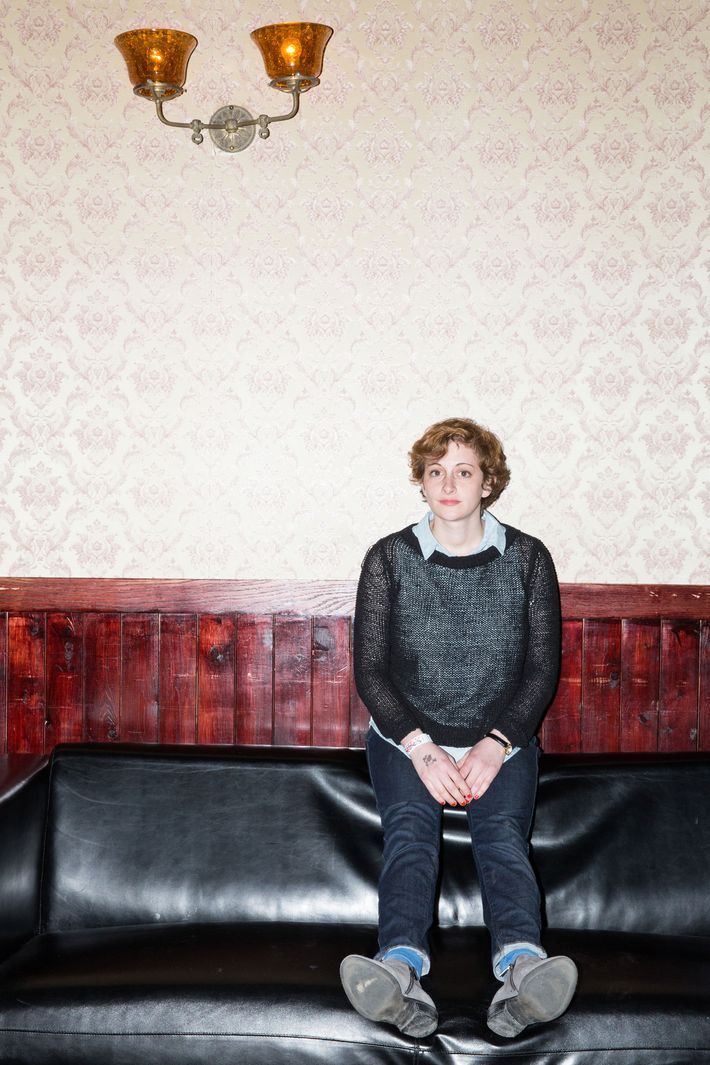
“Would you say you’re the boldest person in here?” Jo Firestone asks a guy seated in the front row of a Williamsburg bar show. She’s introduced her short set as a “sampler” of her (presumably nonexistent) 100-minute one-woman show about moving to New York with her then “love partner,” which she explains is full of pain and anger. Her remedy for the darkness involves this brave audience member.
“What I’m gonna ask you to do,” Firestone continues, “is if anybody at any point says the words sunshine, lollipops, or rainbows, I need you to go come up onstage and you just dance your little heart out. And then when the music stops, you definitely stop. You go sit back down.” Turning back to the small crowd, she invites anyone to shout out any of those words whenever they feel the need.
Two minutes into her story, after the mention of “staying in motels we didn’t even know existed,” the word lollipops rises out of the dark. The next second, Lesley Gore’s “Sunshine, Lollipops, and Rainbows” plays over the sound system, and the plaid-shirted audience member jumps onto the tiny stage and dances enthusiastically for ten seconds, before returning to his seat to a round of applause.
Firestone is one of a group of exciting young comics still doing truly weird, inexplicable comedy, spurred on by the Hollywood success stories of Kristen Schaal and Jenny Slate. Comedians like Aparna Nancherla, Kate Berlant, Michelle Wolf, and Claudia O’Doherty are pioneering a sort of extreme individuality. All comedians are in a constant battle of figuring out what’s funny about them, but these women are pushing that to the maximum. Each has created heightened versions of themselves that feel like hyper-real people living in a hyper-reality onstage. Deeply personal material blends seamlessly with brilliantly ridiculous nonsense, and a premium is put on the relationship to the audience.
Nancherla is skilled at finding the absurdity of everyday life (“Sometimes when one of my white friends apologizes to me, I’ll assume for imperialism on some level”), while Berlant’s elaborately twisting monologues thrust surrealism onto everything (“I was forced into comedy early because of my bone structure”). Wolf’s bits often take the form of hypothetical discussions that escalate into ridiculousness, fleshed out with elaborate act-outs, and O’Doherty, as the eccentric character “Claudia O’Doherty” seems to exist in an alternate universe, one in which her travel-agent mom is constantly having her win contests that fly her away from home.
It’s not an entirely female phenomenon, of course — both Schaal and Slate have male comedy partners (Kurt Braunohler and Gabe Liedman, respectively) who similarly found comedy in maximizing themselves, as do male up-and-comers John Early, Joe Pera, and Julio Torres. But comedy has historically been more accepting of the experimental male comedian, from Andy Kaufman to Zach Galifianakis.
The lineage from Joan Rivers through Roseanne Barr to Iliza Schlesinger is one of women playing in a men’s club, ceding some of their quirks to more mainstream interests. A seeming oddball like Ellen Degeneres may have developed to be truly weird if she hadn’t needed a tight five-minute set for The Tonight Show to jump-start her career. Even Maria Bamford, today’s reigning queen of experimental stand-up, came up in a time when playing clubs was necessary, forcing a divide between her more mainstream club sets, which couch her personal darkness in a more palatable context, and the truly innovative work of her brutally honest Special Special Special, which she recorded in her house with only her parents in the audience. Stand-ups of the Second Boom worry about this so little that they’re not sure if they are even stand-up (they are).

“I don’t know if I really technically do stand-up,” said Firestone in the bar after the above show. “In fact, I know I technically do not do stand-up. I do so poorly in comedy clubs. And it makes sense, because I don’t do stand-up jokes. I don’t blame them.”
Schaal and Slate had similar hesitations, in part because their aims were so different. “I never really saw myself as a stand-up comedian,” Schaal told Backstage.com in 2011. “I always just thought of myself as someone who used the eight minutes or ten minutes she was allotted and had a blast.”
“I have things I say over and over again, for sure, but I’ve never wanted to make an album or really go on the road,” Slate said on You Made It Weird back in 2012. “I don’t want any traction. I just want to be able to express myself and to feel love.”
It might come down to creating a space to call one’s own. Since the mid-’90s, with shows like Janeane Garofalo and Marc Maron’s Eating It, more and more comedians host their own stand-up shows, to the point now that it’s commonplace, if not expected. They are good for self-promotion, but maybe most important they create a very safe space for the given host to hone a specific voice. Both Slate, with Big Terrific, and Schaal, with Hot Tub, blossomed by co-hosting weekly stand-up shows at venues in Brooklyn (Hot Tub now operates in L.A.), where the expanse of unregulated stage time gave them the freedom to experiment and develop independently.
And Firestone, perhaps more than any comedian working, has embraced the autonomy by hosting a multitude of shows each month, and constantly creating or co-creating new premises. Here are just a few: Punderdome 3000, the live pun-based game show/mini-phenomenon Firestone hosts with her dad; the stand-up/variety show Public Services; Live Dubbed Sitcoms, in which she, with the help of comedian friends, dubs over classic TV shows; Hastily Written Masterpiece Starring the Audience, which is a series of jukebox musicals; The Free Pizza Show, which is mini-festival for ten-minute plays about pizza; Firestone Success Academy, a show where comedians give out advice; Beat It, in which people were invited to hit things with foam swimming noodles; The World’s Tiniest Comedy Club, in which Firestone put a bunch of dolls in little chairs and invited people off the street to tell jokes — the dolls would laugh or cry depending on the joke. “We didn’t say this show would make any sense,” wrote the Village Voice about one of Firestone’s events. A New Yorker writer wrote about a Firestone show, “Here was concentrated, unabashed silliness I longed to bottle and smuggle out in my purse.”
“I would go to shows and be like, That space is awesome,” she says. “I’d book the space without knowing what I wanted to do. And then I’d think about it a lot — not a lot, I’d think about it a little bit — and be like, I want to do, like, a beauty pageant,” referring to her annual Inner Beauty Pageant. “And then if that caught on, then we’d do it again. But most of them died.”
The St. Louis native started doing sketch comedy while studying at Wesleyan, and went on to write and perform a comedic play with classmate Dylan Marron, now the voice of Carlos on podcast phenomenon “Welcome to Night Vale.” The two toured the play around colleges before moving to New York; only Firestone ended up pursuing comedy. She took classes at the UCB and is currently on the improv team Witch. But in recent years, she’s broken away from the more regulated comedic styles.
“There’s all this institutionalized comedy where it’s like: go to school, learn how to do it, do it,” she said. “And every time I’ve been a part of that, I don’t know how to follow the rules to make something good. The only thing I can do is just do whatever I want to do and then make it as good as possible.”
She’s incredibly skilled at controlling and steering audience participation, and yet she says she enjoys the unpredictably of that approach. “What I like to do with a lot of the shows is kind of leave it up to the audience,” Firestone says. “If the audience hates it, then it’ll be a horrible show, and if the audience loves it, then it’ll be a great, memorable show. But there’s not a lot of control I put into it.”
One of Firestone’s most memorable bits involves a call-and-response with the audience; she reads a list of peculiar things she has done or felt, and asks any audience member who relates to yell, “I have been there!” They run the gambit from relatively universal (“Sometimes you smile at people in elevators and then you’re like, Why’d I do that?”) to the heartbreaking (“You don’t know how to spell accommodate, but it’s what you’re best at in your interpersonal relationships”).
“I feel like, to get people out of the house is a really big struggle,” Firestone says. “Like, nobody wants to go out of their house. So to really get people out, I think the most exciting thing is the promise of chaos.”


